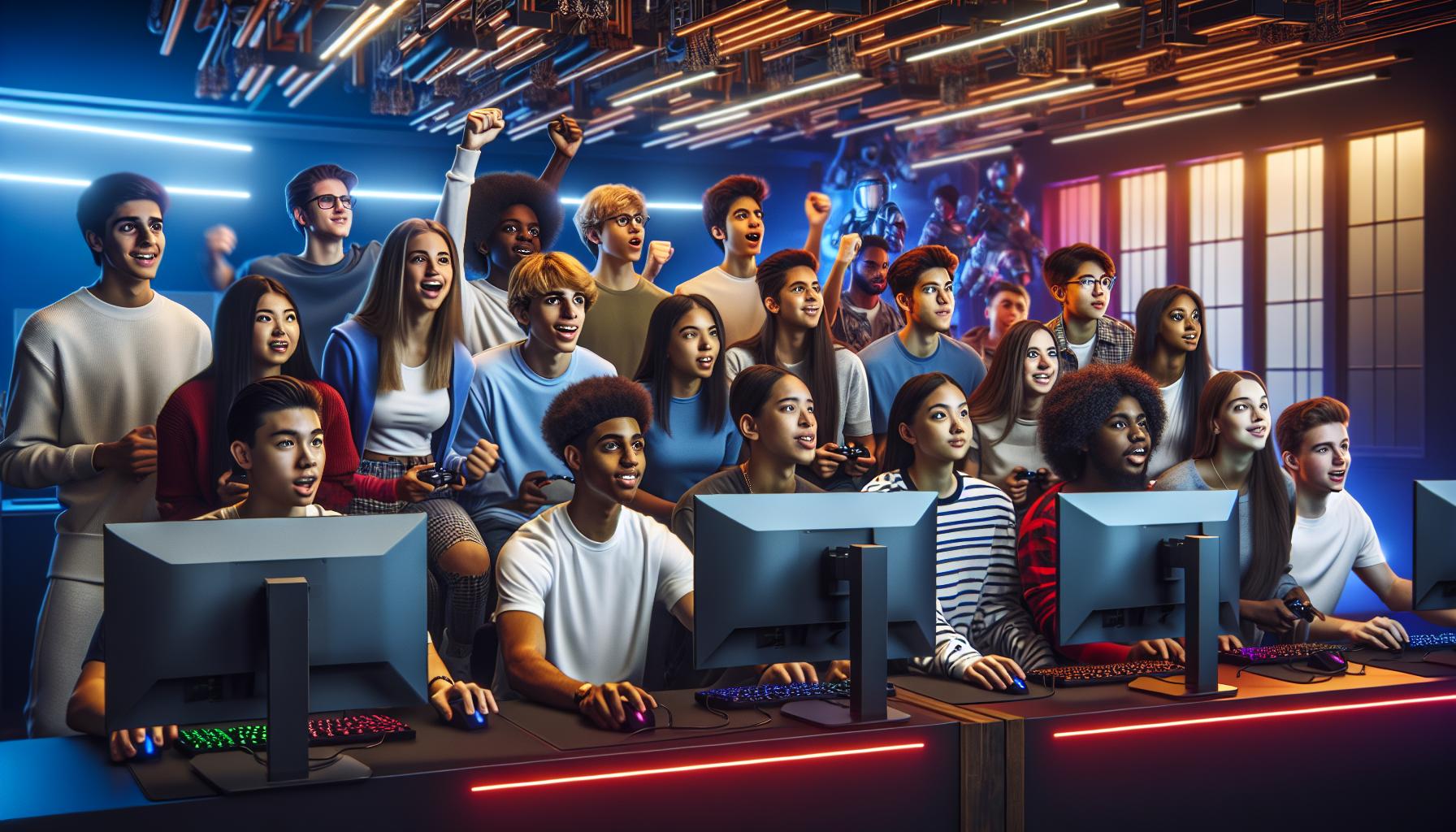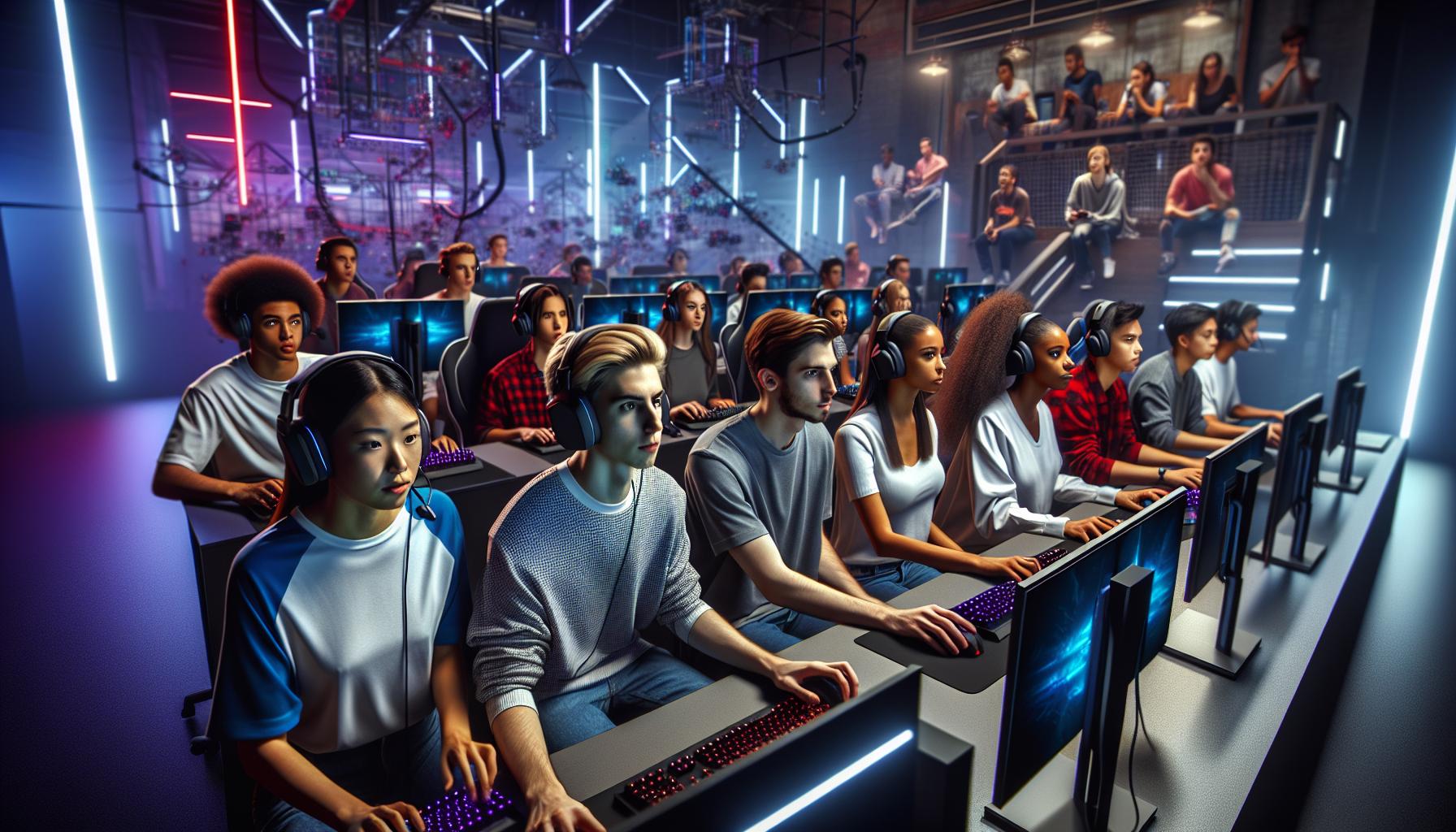In recent years, esports has exploded in popularity, capturing the attention of students and educators alike. As I dive into the world of competitive gaming in schools, I can’t help but marvel at how this phenomenon is reshaping the educational landscape. No longer just a pastime, esports is becoming a legitimate avenue for teamwork, strategy, and skill development.
Schools are beginning to recognize the potential benefits of integrating esports into their curricula. From fostering critical thinking to promoting inclusivity, the impact of esports extends far beyond the gaming console. Join me as I explore how this exciting trend is transforming the way students engage with learning and each other.
Key Takeaways
Growing Popularity: Esports is rapidly becoming an integral part of school curricula, recognized for its potential in fostering teamwork and strategic thinking.
Skill Development: Participation in esports enhances critical skills such as problem-solving, communication, and technological proficiency, preparing students for future challenges.
Inclusivity and Social Interaction: Esports programs promote a sense of community among students from diverse backgrounds, breaking down barriers and enhancing social engagement.
Balancing Academics and Gaming: Schools face the challenge of managing students’ academic commitments alongside esports participation, necessitating clear guidelines and flexible schedules.
Successful Case Studies: Institutions like UC Irvine and Miami University demonstrate effective integration of esports, showcasing its educational benefits and potential career pathways.
Future Prospects: The future of esports in education looks promising with expected advancements in technology, mental health initiatives, and expanded career opportunities in the growing esports industry.
Esports in Schools
Esports continues to grow in educational settings, cultivating skills that benefit students academically and socially. By participating in esports programs, students enhance their teamwork and communication abilities, essential for success in various fields.
Participating in esports teaches students strategic thinking through game mechanics and tactical decision-making. They learn to analyze complex scenarios, foresee consequences, and adapt gameplay, which directly correlates to improved critical thinking skills.
Inclusivity plays a significant role in esports. Students of all backgrounds can engage, breaking down barriers that often exist in traditional sports. Programs promote collaboration, bridging differences and fostering friendships among diverse groups.
Schools are effectively using esports to boost student engagement. Competitive gaming creates an avenue for increased attendance and academic involvement, with many schools organizing tournaments that unite school communities.
In addition, incorporating esports into curricula supports technological literacy. Students enhance their proficiency in digital tools, coding, and game design, vital skills in today’s job market. Educators find that integrating esports sparks interest in STEM subjects, inspiring students to pursue careers in technology and innovation.
Esports programs also enable career exploration. Students can connect with professionals in the gaming industry, opening doors to internships and job opportunities. Schools that embrace esports provide students a platform to explore various roles, from game developers to event organizers.
Overall, the integration of esports in schools not only enriches the learning experience but also prepares students for future success in an increasingly digital world.
Benefits of Esports in Education

Esports in educational settings offers numerous advantages that enhance learning experiences and student interactions. This section details the primary benefits encompassing skill development and social interaction.
Skill Development
Esports cultivates a variety of essential skills in students, such as teamwork, strategic thinking, and problem-solving. Students learn to work collaboratively within teams to achieve common goals, fostering communication that transcends traditional classroom boundaries. Engaging in complex gameplay scenarios forces students to analyze situations, make quick decisions, and adapt their strategies on the fly. These experiences sharpen their critical thinking skills and promote cognitive growth. Furthermore, esports often requires technical proficiency, increasing students’ familiarity with technology and digital tools essential in today’s job market. Ultimately, participation in esports programs prepares students for real-world challenges and enhances their overall academic performance.
Social Interaction
Esports significantly enhances social interaction among students by providing a platform for collaboration and community building. Students from diverse backgrounds come together, forming friendships that might not develop in other contexts. Tournaments and team competitions create opportunities for students to engage with peers, fostering a sense of belonging and camaraderie. Additionally, esports encourages inclusivity, as it allows students of varying physical abilities to participate equally, breaking down barriers present in traditional sports. The teamwork and cooperation inherent in esports cultivate a supportive environment where students learn to appreciate different perspectives and work harmoniously toward shared objectives. These interactions not only enrich the school experience but also prepare students for positive social engagement in their future endeavors.
Challenges of Implementing Esports in Schools

Esports in schools presents several challenges that institutions must address to ensure successful integration. Key issues include funding and resource allocation, as well as balancing academics with gaming commitments.
Funding and Resources
Funding for esports programs often lacks adequate support. Schools typically face budget constraints that limit investments in necessary technology, gaming equipment, and training facilities. Many institutions rely on grants, sponsorships, or community partnerships to bridge the financial gap. Without sufficient funds, securing quality hardware and maintaining competitive teams remains a struggle. Schools must also consider hiring trained staff or coaches, which adds to the financial burden. Establishing a sustainable esports program depends on a clear financial plan that identifies potential funding sources while ensuring that costs stay manageable.
Balancing Academics and Gaming
Balancing academics with gaming represents another significant challenge in esports implementation. Students must prioritize their coursework while participating in tournaments and game practice. This dual commitment can lead to conflicts, especially during peak academic periods, such as exam weeks. Schools need to develop guidelines that promote responsible gaming habits without compromising academic goals. Creating flexible schedules for practices and competitions helps students manage their time effectively. Furthermore, integrating esports with academic subjects can reinforce valuable lessons while maintaining student engagement, fostering a more holistic educational experience.
Case Studies of Successful Esports Programs

Several schools showcase effective esports programs that highlight their educational benefits. Here are notable examples:
University of California, Irvine (UCI)
UCI features an esports program embedded within its campus culture. The school established a dedicated esports arena equipped with high-end technology. Student involvement includes competitive teams and academic initiatives, integrating esports with coursework in areas such as game design and digital media. UCI’s outreach includes partnerships with industry leaders, enhancing career opportunities for students.
Miami University
Miami University launched its esports initiative in 2018, focusing on teamwork and leadership skills. The program fosters collaboration among students from diverse majors. Students participate in various tournaments, promoting school spirit and community engagement. The program also offers coursework related to the gaming industry, preparing students for future careers.
Northwood University
Northwood University developed a competitive esports program that emphasizes business management principles. The program’s structure includes team management and branding strategies, providing students with hands-on experience in the esports industry. Students also engage in community outreach, demonstrating the program’s commitment to positive social impact.
New York University (NYU)
NYU uses esports as a tool for enhancing digital literacy among students. The university offers courses focusing on the analytical aspects of gaming, such as game mechanics and player behavior. Esports teams also compete at various levels, fostering teamwork and strategic thinking. NYU emphasizes community building through its esports initiatives, encouraging collaboration among students from different disciplines.
K12 Schools
Certain K12 schools implement successful esports programs by focusing on inclusivity and engagement. For example, a high school in Minnesota developed a gaming club that attracted students from various backgrounds. The club fosters social interaction and teamwork among its members. Moreover, schools report improved attendance and academic performance linked to esports participation.
These case studies demonstrate how various institutions successfully integrate esports into their programs. Each example highlights the importance of community engagement, academic opportunities, and skill development, reinforcing esports’ potential as a valuable educational tool.
Future of Esports in Schools
Esports in schools is set to evolve significantly in the coming years. Schools increasingly recognize the educational potential of esports, integrating it into curricula as a key component of modern education. Technology continues to advance, allowing for innovative teaching methods and improved access to resources. Schools may adopt esports-focused programs, providing students with opportunities to learn both technical and interpersonal skills.
Increased focus on mental health and well-being anticipates the inclusion of support systems for student gamers. Schools could create initiatives that promote healthy gaming practices, balancing academics with gaming commitments. Wellness programs may evolve to include esports, ensuring that students manage their time effectively while pursuing their passions.
Career pathways in the esports industry are expanding. Educational institutions may form partnerships with gaming companies, offering students internships and mentorship opportunities. The emphasis on practical experience allows students to gain insights into potential careers, preparing them for a competitive job market.
Emerging trends in esports education highlight the importance of soft skills. Schools might put additional emphasis on teamwork, communication, and leadership abilities that align with esports participation. Students could benefit from courses designed to enhance these skills, making them well-rounded candidates for future employment.
Growing interest in competitive gaming may lead to more robust infrastructures within schools. Dedicated esports spaces may become common as schools invest in technology and training facilities. This upgraded infrastructure enhances the overall experience for students, encourages participation, and fosters a sense of community.
As esports continues to gain traction in educational settings, continuous evaluation of programs will be vital. Schools should focus on assessing the impact of esports on student engagement, academic performance, and social interactions. Gathering data will help in refining programs and ensuring their effectiveness in preparing students for the future.
Embracing Esports in Schools
Embracing esports in schools is more than just a trend; it’s a transformative approach to education. I’ve seen firsthand how these programs can engage students in ways traditional methods often can’t. By fostering teamwork and critical thinking, esports prepares students for both academic and social success.
As we look to the future, I’m excited about the possibilities that lie ahead. With the right support and resources, schools can create environments where students thrive. The integration of esports not only enhances learning but also builds community and opens doors to career opportunities. It’s clear that esports is here to stay, and I can’t wait to see how it continues to shape the educational landscape.